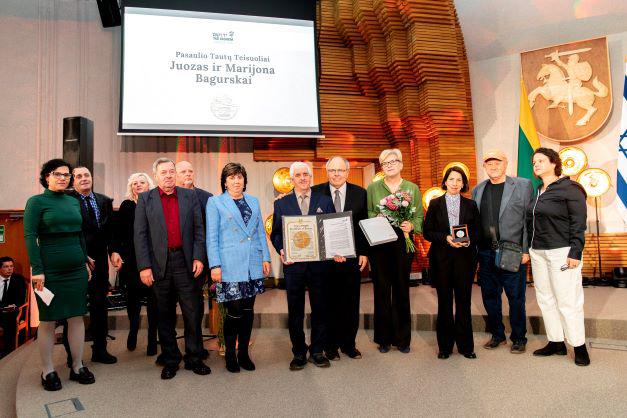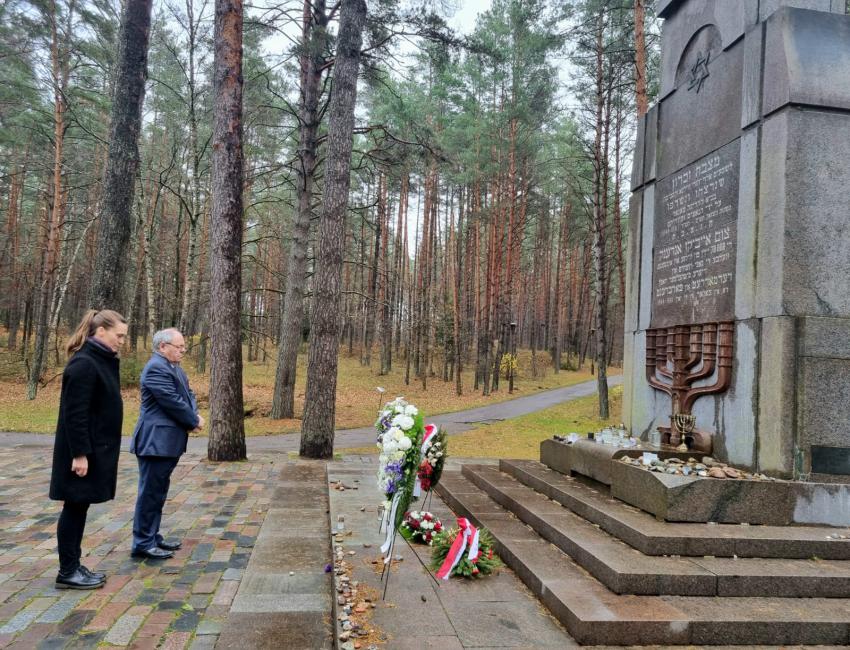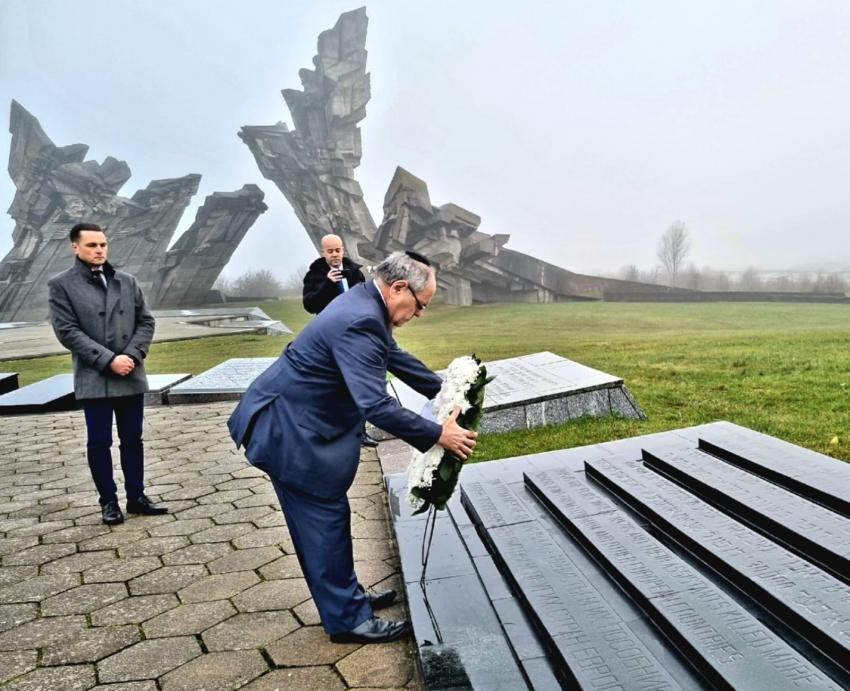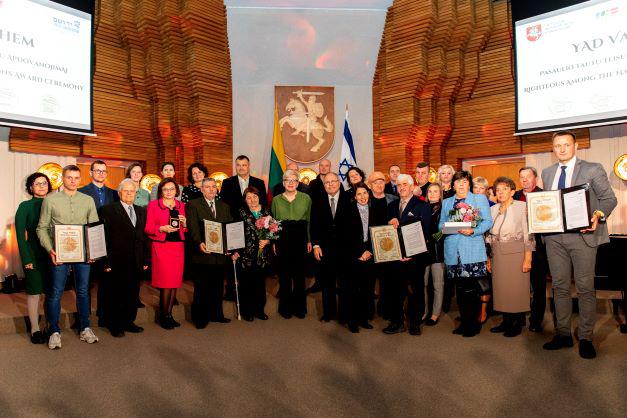
Descendants of Juozapas and Marijona Bagurskas receiving the Righteous Among the Nations Award from Yad Vashem Chairman Dani Dayan and Prime Minister of Lithuania Ingrida Šimonytė
08 November 2022
Yesterday, while on a State visit to Lithuania, Yad Vashem Dani Dayan presented descendants of Juozapas and Marijona Bagurskas; Aksentij, Martriona Burlakova and their daughter, Zinaida; Kazimieras and Marcijona Ruzgys and Jonas and Ona Žvinklevičius, four Lithuanian families recently recognized posthumously by Yad Vashem, the World Holocaust Remembrance Center in Jerusalem, as Righteous Among the Nations, with the medal and certificate traditionally awarded to recipients of this title. Also in attendance was Israeli Ambassador to Lithuania HE Hadas Wittenberg Silverstein, Lithuanian Prime Minister HE Ingrida Šimonytė and Holocaust survivor Maksim Broer, who was rescued by the Bagurskai family, and traveled back to Lithuania to participate in the ceremony. A recorded message from Chaya Landau, a Holocaust survivor rescued by the Ruzgys, was broadcast at the event, which took place in the Government Palace in Vilnius.
Holocaust survivor Chaya Landau remarked:
"The world has never found a vaccination against antisemitism, which once again seems to be a pandemic. However, the Ruzgys family, and few others like them, were naturally immune to this horrible disease…they had the sense of nobility and courage to confront evil and were a beacon of light in humanity's darkest hour."
The medal and certificate were presented by the Yad Vashem Chairman and Israeli Ambassador to Lithuania to the families of the Righteous Among the Nations. The Mayor of Šiauliai received the medal and certificate on behalf of Jonas and Ona Žvinklevičius, whose family was unable to attend the ceremony.
Prior to participating in this Righteous Among the Nations ceremony, Dayan visited the authentic murder sites at the Ninth Fort outside of Kaunas and the murder site in the Ponary Forest on the outskirts of Vilnius, where many thousands of Lithuanian Jews were murdered by the German Nazis and their local collaborators. The Deputy Speaker of the Seimas Radvilė Morkūnaitė-Mikulėnienė accompanied Dani Dayan tothe Ponary Forest Memorial site. He also visited the Vilna Gaon Jewish Museum and Jewish community centers in both Kaunas and Vilnius. Afterwards, Dayan also met with 93-year-old Holocaust survivor Fania Brantsovsky (Yochlas) from Vilnius.
Yad Vashem Chairman Dani Dayan stated:
"No visit to Lithuania would be complete without paying respects to the many thousands of my brethren murdered at these authentic murder sites. Yet I cannot help but be uplifted, having presided over today's ceremony of the newly-recognized Righteous Among the Nations, and my meetings these past few days with the Heads of State in Lithuania that testify to the interest that Lithuania sees in keeping the memory of the Holocaust alive. In my words at events and meetings, I emphasized the importance of historical accuracy and made reference to the part that Lithuanians themselves played in the persecution and murder of the Jews during the Holocaust," said Dayan. "We very much hope that these events and the educational messages that emerged from them will encourage national and personal introspection, as well as a commitment to deal with the past and the emergence of contemporary antisemitism around the world."
During his visit, Dayan met with senior government officials, including Lithuanian Prime Minister HE Ingrida Šimonytė, Foreign Minister Gabrielos Landsbergis, and Parliament Speaker Victoria Chimilita-Nielsen and other leaders and influencers to discuss how Lithuania can continue to raise awareness of the history of the Holocaust amongst its citizens through extensive educational activities.
Rescue Stories
The Ruzgys Family: Kazimieras and Marcijona Ruzgys
Breina-Frieda Intriligator (née Richman) lived in Kaunas (Kovno) with her husband Mordechai and daughter Chaya, born in 1938. With the occupation of Kaunas by the Germans, the family was forced to move to the ghetto. On 18 August 1941, Mordechai was murdered. Breina-Frieda and Chaya (mother and daughter) remained in the ghetto with relatives until March 1944. Through the mediation of a mutual acquaintance, the two arrived at the home of the Ruzgys family in the Kaltinenai area. In August 1944, after liberation, Breina-Frieda and her daughter returned to Kaunas, where they were reunited with surviving relatives. Together they left Lithuania in 1945 and stayed in a displaced persons camp in Germany. Breina-Frieda, her daughter and her two brothers, David and Jacob, who were liberated at Dachau, immigrated to the USA. Later, in 1964, Chaya (later Landau) immigrated to Israel.
The Žvinklevičius Family: Jonas and Ona Žvinklevičius
Tzvi Hirsh and Braina Rozmaitis had their first child, Moshe, in 1938. The family lived in the city of Šiauliai in northern Lithuania. In 1941 the couple had a daughter - Hana. Wehrmacht forces occupied the city in June 1941. Tzvi Hirsh and his family, together with his mother and two sisters were sent to live in a nearby ghetto. Tzvi worked unloading coal from trains, in excavations and in a leather processing factory, from which he stole leather and thus supported his family. In November 1943, there was a Kinderaktion in the ghetto during which all the children in the ghetto were taken and murdered, including Hana.
Jonas Žvinklevičius, a childhood friend of Tzvi, lived in Šiauliai with his wife Ona and their children. In July 1944, with the liquidation of the ghetto pending, Tzvi and Braina managed to escape. They met Jonas, who offered to hide them in his house. As an employee of the railway company, Jonas wore a Reichsbahn worker's hat and blue ribbon. About two weeks before the liberation of the city, the family fled to a nearby village where they hid until the liberation by the Red Army on 27 July 1944. After the return of the Soviet regime, Jonas was arrested by SMERSH (military interior apparatus of the secret police). Tzvi and Braina went to the Soviet headquarters, told them the rescue story, and as a result Jonas was released. In 1946, Braina gave birth to Genya. They maintained close contact with their rescuers until they immigrated to Israel.
The Burlakova Family: Aksentij, Martriona Burlakova and their daughter, Zinaida
Izraelis and Rachelė Gantovnikas lived in the village of Stajėtiškis (Švenčionys District). Before the German invasion, about 45 families lived in the village, almost all of them Jewish. The occupation by the German Army led to acts of robbery and murder as well as cases of Lithuanians and Poles using weapons left behind by the Russian Army, forcing their Jewish neighbors to leave their homes and looting what was left of them.
When winter came, Izraelis,Rachelė and their baby Rebeka fled the ghetto seeking to escape the pending liquidation. They knocked on the door of the Burlakova family, whom the father of the family knew, and asked them for shelter. The Burlakova family was afraid due to the large presence of informants in the area, but they agreed to take in baby Rebeka.
The Burlakovas had four children, with the youngest of them, Zina, becoming Rebeka's nanny. In July 1944 the area was liberated. Rebeka's parents moved from place to place and survived until the family immigrated to Eretz Israel (Mandatory Palestine) in 1946.
The Bagurskas Family: Juozapas and Marijona Bagurskas
Maksim Broer was born in Kaunas (Kovno), the second son of parents Šlomas (Šleime) Broer and Roza (Reizel) née Ring. Ilya, the eldest son, was sent at the beginning of summer 1941 to Reizel's parents, but in the first days of the war, Polish neighbors set fire to Reizel's parents' house, killing all its residents. Maksim and his parents were deported to the Kaunas ghetto. The father worked in the construction of the airport and the mother worked in a hosiery factory. Lithuanian women also worked in the factory, among them Marijona Bagurskas. who expressed her willingness to save a child from the ghetto on the condition that he would not be circumcised. Maksim, who was not circumcised due to his father's communist views, was smuggled out of the ghetto in a sack of potatoes to the home of the Bagurskas family.
The rescuers were in their 50s, parents of two daughters and a son disabled from birth. The family provided for Maksim as if he were one of their own. When he came to them, he spoke only Yiddish, which the family had to hide from the neighbors too.
After the liberation of the area, Maksim's father came to the Bagurskas family home, picked up his son and placed him in a Jewish orphanage in Kovno because he was drafted into the Red Army. Maksim remembers that Marijona visited him at the orphanage, and brought him food from their farm.
In 1945, Maksim's mother, Roza, was liberated at the Stutthof concentration camp and returned to Kaunas hoping to be reunited with her son. Šlomas returned home from the front and the family continued to live in Kaunas after the war. In 1948 they had another child - Eliezer. The Bagurskas and Broer families kept in touch, and in 1972 Maksim immigrated to Israel with his family.









